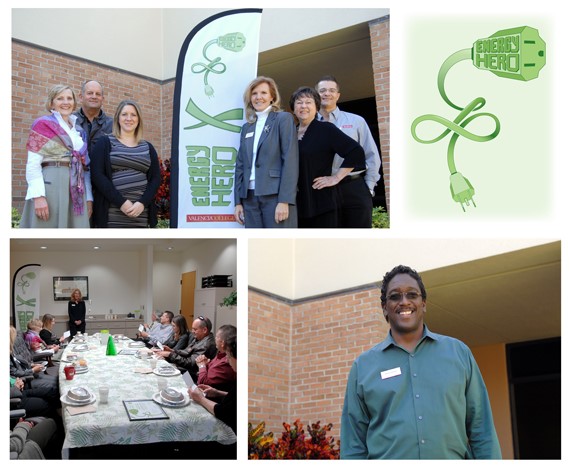Energy and Climate
The American College & University Presidents' Climate Commitment (ACUPCC) is a high-visibility effort to address global climate disruption undertaken by a network of colleges and universities that have made institutional commitments to eliminate net greenhouse gas emissions from specified campus operations, and to promote the research and educational efforts of higher education to equip society to re-stabilize the earth's climate. Its mission is to accelerate progress towards climate neutrality and sustainability by empowering the higher education sector to educate students, create solutions, and provide leadership-by-example for the rest of society.
The Commitment recognizes the unique responsibility that institutions of higher education have as role models for their communities and in educating the people who will develop the social, economic and technological solutions to reverse global warming and help create a thriving, civil and sustainable society.
Valencia College signed the American College & University Presidents Climate Commitment on June 16, 2009. As of February 2014, 679 colleges and university presidents have signed the commitment.
ACUPCC institutions have agreed to:
- Complete an emissions inventory.
- Within two years, set a target date and interim milestones for becoming climate neutral.
- Take immediate steps to reduce greenhouse gas emissions by choosing from a list of short-term actions.
- Integrate sustainability into the curriculum and make it part of the educational experience.
- Make the action plan, inventory and progress reports publicly available.
Programs such as recycling, converting to organic fertilizers, using renewable energy, or replacement of older less efficient machinery can help reduce our footprint. The College’s major GHG source include:
- Electricity Consumption
- Natural Gas Consumption
- Vehicle Fleet Fuel Consumption
- Commuter Fuel Consumption
- Fugitive Emissions from refrigerants
- Solid Waste
- Emissions from applications of fertilizer
Read Valencia’s 2006-2008 Greenhouse Gas (GHG) Inventory here.
Follow Valencia’s GHG reporting here.
Climate Action Plan and Update
Based on the 2010 Greenhouse Gas Inventory, the College developed a long term Climate Action Plan in 2010. This plan outlines a set of strategies across four categories (transportation, energy, solid waste, and education & outreach) which, when implemented, will guide the college to climate neutrality by 2060.
Energy Efficiency and Conservation
AASHE had published a case study on Valencia College's Energy Efficient efforts.
In 2009, Valencia College embarked on an ambitious program to achieve savings through strategic shut down procedures, with the Operations Manager, Energy Conservation focused on this task. Systems shut down during unoccupied periods include everything but science labs, security lighting, and the mdf (main distribution facility) and server rooms. The College now saves approximately $1.3 million dollars per year from this behavioral change program. Savings, compared against a baseline of one year prior to start of the program, continue to grow.
Unoccupied and occupied energy audits, oversight of comfort complaints, adoption of college-wide guidelines for energy efficiency, and communication with faculty and staff by a variety of means are aspects of this effort. Review of class schedules and relocation of classes where appropriate allows HVAC energy adjustments and important strategies. This successful program has involved a five-year contract with Cenergistic, an outside firm specializing in behavioral energy savings.
For information about your on-campus energy use, shutdowns, to make suggestions, or request a presentation, contact Patti Riva, Operations Manager, Energy Conservation by e-mail or call 407-582-5495.
The Energy Hero Award will be designated periodically as a way to recognize those who submit energy-saving ideas and programs. Nominations for the Energy Hero Award, including self-nominations, and energy saving ideas should be submitted to Patti Riva, Operations Manager of Energy Conservation.

All campuses of Valencia College are using building automation systems (BAS). BAS is used automate temperatures and lighting.
West Campus just received a $900,000 3-year grant from the National Science Foundation to develop curriculum, hire and train faculty, and purchase lab equipment for a new A.S. degree in Energy Management Controls Technology (EMCT).
For more information about the Valencia College sustainability degree, contact: Dr. Deb Hall at dhall@valenciacollege.edu or 407-582-1963.
For technical information about the college's energy efficiency programs, contact: Robert Hickman, Operations Manager, Energy Efficiency, at rhickman@valenciacollege.edu or 407-582-1768.
The different campuses purchase electricity from four power companies, each with different rate structures, providing challenges and opportunities. Without the rebates that utilities provide in states that have Renewable Energy Portfolio Standards, utilizing renewable energy has not been pursued. However, we do have solar panels on one of our LEED Gold buildings, the UCF-Valencia Joint Use Building on West Campus. This building houses electrical engineering and the teaching of renewable energy technologies.
A 102.48 kW array of 336 solar panels each producing 305 watts provides approximately 16 percent of the building's electricity (July 2011-June 2012 data).
